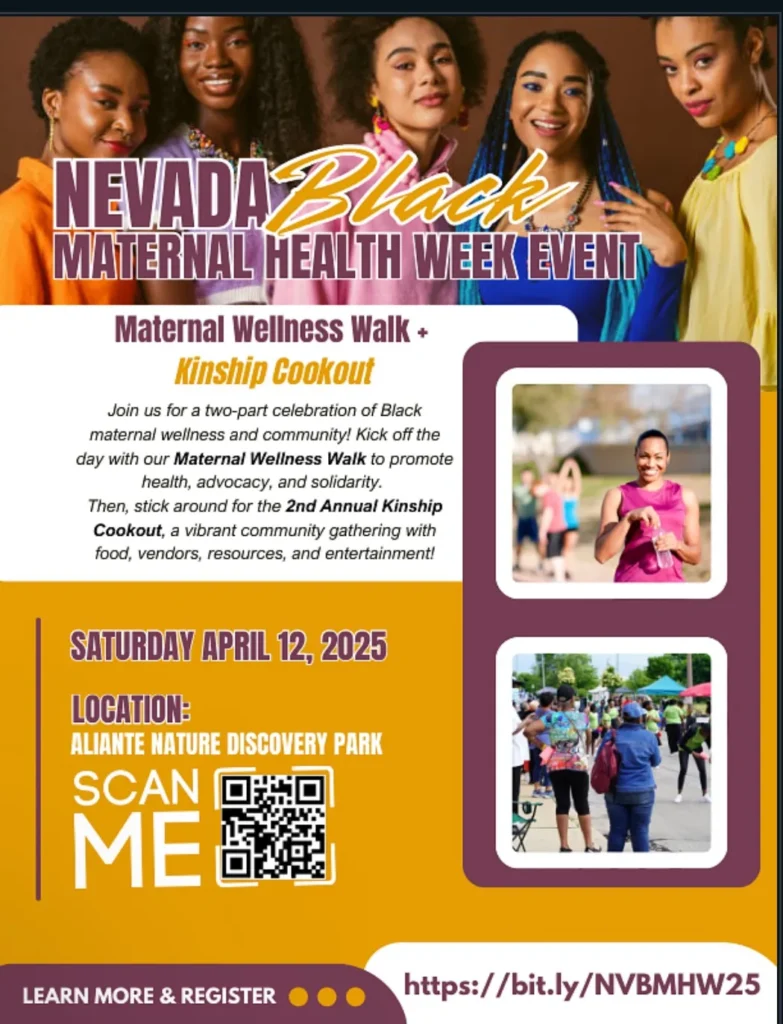
This week is Black Maternal Health Week, a national campaign to bring awareness to the unique challenges and disparities faced by Black mothers and birthing people. As we honor this moment through community events like Nevada’s Maternal Wellness Walk and Kinship Cookout (see flyer below), we also confront the deeper stories too often left out of mainstream maternal health conversations. Stories about chronic pain, invasive treatments, opioid prescriptions, and the pathways they can create toward dependency and substance use disorder.
The underdiagnosis of endometriosis in Black women
Endometriosis is a chronic condition that affects an estimated 11 percent of women of reproductive age in the United States. For Black women, however, diagnosis is often delayed or missed entirely. Research shows that racial biases in medicine continue to minimize Black women’s pain and delay referrals for testing, resulting in years, sometimes decades, of unmanaged symptoms (Bougie et al., 2019; Saunders et al., 2021).
When endometriosis is finally diagnosed, the recommended treatment is too often a hysterectomy. Black women are twice as likely as white women to undergo this life-altering surgery, frequently at younger ages and with less discussion about alternatives (Jacoby et al., 2010; Wright et al., 2013). For many, this is not only a medical decision but a traumatic loss of fertility, identity, and autonomy.
Pain management after surgery and the opioid dilemma
After hysterectomy or related procedures, pain management becomes a major concern. Opioids are commonly prescribed as part of post-surgical care, and while they can offer short-term relief, they can also mark the beginning of a complex and dangerous relationship with substances.
Black women face a dual burden: they are less likely to receive adequate pain treatment overall, yet when prescribed opioids, they are more likely to lack access to monitoring, tapering plans, or alternative therapies (Singhal et al., 2016; Lagisetty et al., 2019). This makes them vulnerable to developing dependence. For those in recovery, a new prescription can lead to recurrence of use, particularly when emotional and physical trauma are both present (Volkow et al., 2016).
Unsuccessful pregnancies and substance use risk The links between reproductive trauma and substance use are significant. Miscarriages, stillbirths, infertility, and other unsuccessful pregnancy outcomes can create deep emotional
wounds that go unaddressed in traditional healthcare. When combined with chronic pain or surgical trauma, these experiences increase the risk of opioid use as a form of coping (Jessup et al., 2020; Armstrong et al., 2019). The cycle of pain, prescription, and dependence often begins in a clinical setting, but continues in silence. And silence is a key driver for mental health and existential crises.
NOCE’s commitment to the conversation
At NOCE, we believe that healing must include accountability, truth, and culturally responsive care. We are using Black Maternal Health Week to elevate the lived experiences of Black women who have navigated complex and overlapping systems of care, pain, and survival.
Beyond this awareness week, we are dedicated to continuing the conversation about how reproductive health, mental health, and opioid use disorder intersect for women of color, and give a platform for the needs of these women to be seen, heard, and understood.
Attend the Wellness Walk and Kinship Cookout
Join us this Saturday, April 12, 2025, at Aliante Nature Discovery Park for a day of movement, food, and fellowship. The Maternal Wellness Walk will promote advocacy and community care, followed by the 2nd Annual Kinship Cookout featuring vendors, entertainment, and resources for Black maternal health and healing.
Register and learn more at https://bit.ly/NVBMHW25

References
Armstrong, E., Olds, D. L., & Dore, M. (2019). Pregnancy loss and its association with maternal substance use: A review of the literature. Journal of Perinatal & Neonatal Nursing, 33(3), 233–241. https://doi.org/10.1097/JPN.0000000000000414
Bougie, O., Yap, M. I., Sikora, L., Flaxman, T., Singh, S. S., & Allaire, C. (2019). Endometriosis and race: A systematic review and meta-analysis of racial differences in the prevalence of endometriosis. Journal of Minimally Invasive Gynecology, 26(2), 302–311. https://doi.org/10.1016/j.jmig.2018.09.016
Jacoby, V. L., Autry, A., Jacobson, G., Domush, R., Nakagawa, S., & Jacoby, A. (2010). Nationwide use of laparoscopic hysterectomy compared with abdominal and vaginal approaches. Obstetrics & Gynecology, 115(5), 1091–1099. https://doi.org/10.1097/AOG.0b013e3181d99219
Jessup, M. A., Harkins, D., & McCarty, D. (2020). Substance use disorders and maternal trauma. Substance Abuse: Research and Treatment, 14, 1–9. https://doi.org/10.1177/1178221820912690
Lagisetty, P. A., Healy, N., Garpestad, C., & Bohnert, A. S. B. (2019). Disparities in opioid prescribing by race and ethnicity for patients with non–cancer pain. Pain, 160(4), 833–840. https://doi.org/10.1097/j.pain.0000000000001464
Saunders, M., Boyer, R., & Black, A. (2021). Barriers to the diagnosis and treatment of endometriosis in Black women. Obstetrics and Gynecology Clinics of North America, 48(4), 697–712. https://doi.org/10.1016/j.ogc.2021.07.009
Singhal, A., Tien, Y. Y., & Hsia, R. Y. (2016). Racial–ethnic disparities in opioid prescriptions at emergency department visits for conditions commonly associated with prescription drug abuse. PLOS ONE, 11(8), e0159224. https://doi.org/10.1371/journal.pone.0159224
Volkow, N. D., McLellan, A. T., Cotto, J. H., Karithanom, M., & Weiss, S. R. B. (2016). Characteristics of opioid prescriptions in 2009. Journal of the American Medical Association, 305(13), 1299–1301. https://doi.org/10.1001/jama.2011.401




